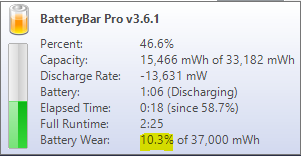Saudate
Posts: 16 +0
I have an Acer laptop I bought last January 2013.
It's a 10 month laptop and someone told me that I should be removing the battery when I am using AC power. I was hesitant at first so I installed a software called BatteryBar Pro. Upon installing, I was surprised that my battery wear was already at 10.3%!
[CENTER]
 [/CENTER]
[/CENTER]
I was surprised that I had already wore 10.3% of my battery in just 10 months. Now I am worried that it will not last longer as expected.
I use my laptop for coding, gaming and browsing (mostly on gaming) and I always run on AC power while the battery is plugged in.
I tried some suggestions like removing the battery while on AC but when I did, my laptop did not power up. It does not open if the battery is out and AC is plugged in. I always put my laptop on an elevated stand I constructed when using it but is this enough?
Are there any other ways to minimize my battery wear? Thank you!

It's a 10 month laptop and someone told me that I should be removing the battery when I am using AC power. I was hesitant at first so I installed a software called BatteryBar Pro. Upon installing, I was surprised that my battery wear was already at 10.3%!
[CENTER]

I was surprised that I had already wore 10.3% of my battery in just 10 months. Now I am worried that it will not last longer as expected.
I use my laptop for coding, gaming and browsing (mostly on gaming) and I always run on AC power while the battery is plugged in.
I tried some suggestions like removing the battery while on AC but when I did, my laptop did not power up. It does not open if the battery is out and AC is plugged in. I always put my laptop on an elevated stand I constructed when using it but is this enough?
Are there any other ways to minimize my battery wear? Thank you!
